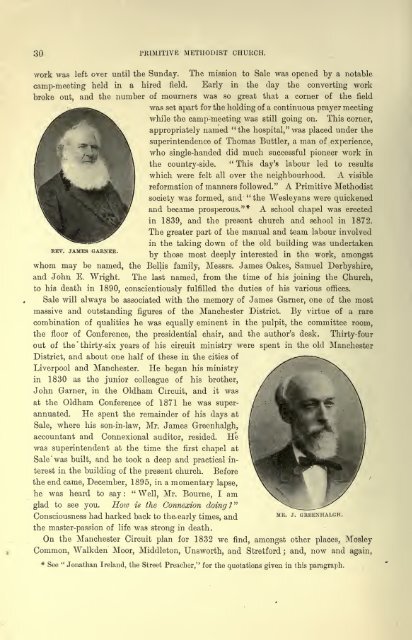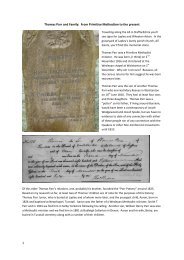Vol 2, pages 1-100 - My Primitive Methodist Ancestors
Vol 2, pages 1-100 - My Primitive Methodist Ancestors
Vol 2, pages 1-100 - My Primitive Methodist Ancestors
Create successful ePaper yourself
Turn your PDF publications into a flip-book with our unique Google optimized e-Paper software.
30 PRIMITIVE METHODIST CHURCH.<br />
work was left over until the Sunday. The mission to Sale was opened by a notable<br />
camp-meeting held in a hired field. Early in the day the converting work<br />
broke out, and the number of mourners was so great that a corner of the field<br />
was set apart for the holding of a continuous prayer meeting<br />
while the camp-meeting was still going on. This corner,<br />
appropriately named "the hospital," was placed under the<br />
superintendence of Thomas Buttler, a man of experience,<br />
work in<br />
who single-handed did much successful pioneer<br />
the country-side.<br />
" This day's labour led to results<br />
which were felt all over the neighbourhood. A visible<br />
reformation of manners followed." A <strong>Primitive</strong> <strong>Methodist</strong><br />
society was formed, and "the Wesleyans were quickened<br />
and became prosperous."* A school chapel was erected<br />
in 1839, and the present church and school in 1872.<br />
The greater part of<br />
the manual and team labour involved<br />
in the taking down of the old building was undertaken<br />
REV. JAMES GARNER.<br />
by those most deeply interested in the work, amongst<br />
whom may be named, the Bellis family, Messrs. James Oakes, Samuel Derbyshire,<br />
and John E. Wright. The last named, from the time of his joining the Church,<br />
to his death in 1890, conscientiously fulfilled the duties of his various offices.<br />
Sale will always be associated with the memory of James Garner, one of the most<br />
massive and outstanding figures of the Manchester District. By<br />
virtue of a rare<br />
combination of qualities he was equally eminent in the pulpit, the committee room,<br />
the floor of Conference, the presidential chair, and the author's desk. Thirty- four<br />
out of the ' thirty-six years of his circuit ministry were spent<br />
District, and about one half of these in the cities of<br />
Liverpool and Manchester. He began his ministry<br />
in 1830 as the junior colleague of his brother,<br />
John Garner, in the Oldham Circuit, and it was<br />
at the Oldham Conference of 1871 he was superannuated.<br />
He spent the remainder of his days at<br />
Sale, where his son-in-law, Mr. James Greenhalgh,<br />
accountant and Connexional auditor, resided. He<br />
was superintendent at the time the first chapel at<br />
Sale<br />
'<br />
was built,<br />
and he took a deep and practical interest<br />
in the building of the present church.<br />
Before<br />
the end came, December, 1895, in a momentary lapse,<br />
he was heard to say : " Well, Mr. Bourne, I am<br />
glad to see you. How is the Connexion doing<br />
? "<br />
Consciousness had harked back to the- early times, and<br />
in the old Manchester<br />
MR. J. GREENHALGH.<br />
the master-passion of life was strong in death.<br />
On the Manchester Circuit plan for 1832 we find, amongst other places, Mosley<br />
Common, Walkden Moor, Middleton, Unsworth, and Stretford ; and, now and again,<br />
* See<br />
" Jonathan Ireland, the Street Preacher," for the quotations given in this paragraph.



